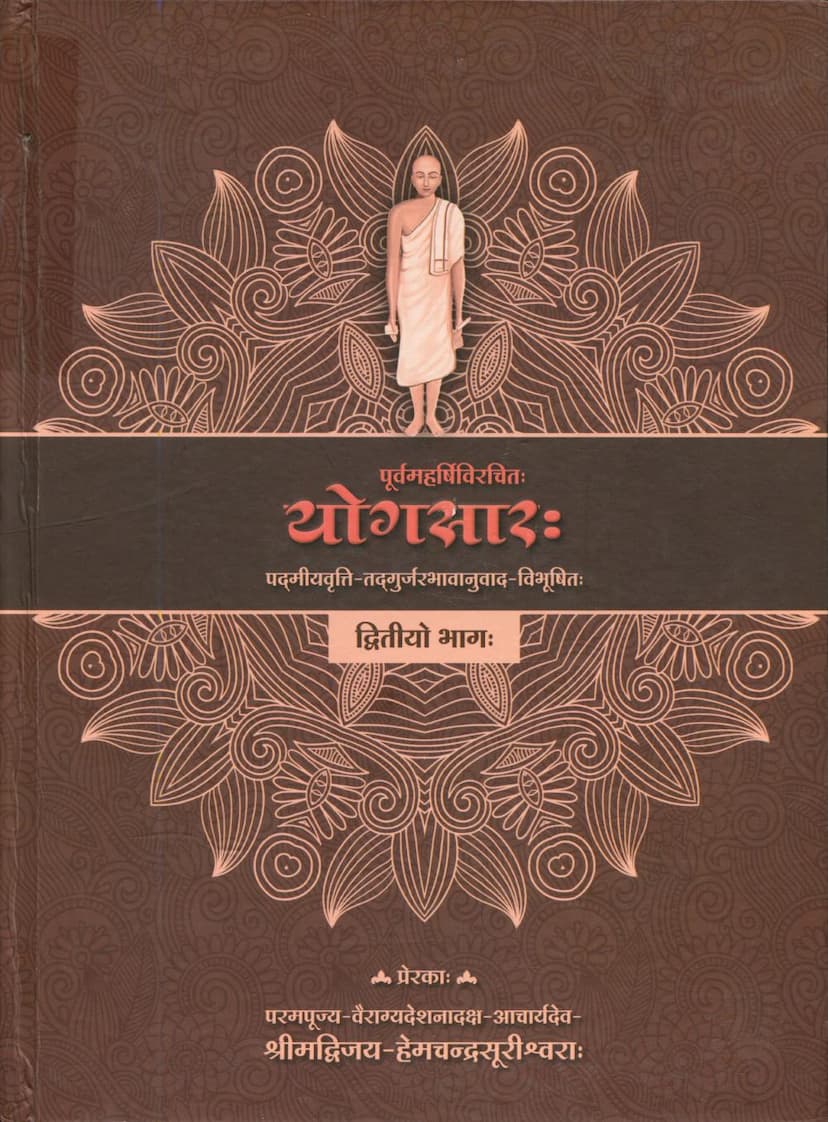Yogsar Part 02
Added to library: September 2, 2025

Summary
Certainly! Here's a comprehensive summary of "Yogsar Part 02" by Ratnabodhivijay, published by Jinshasan Aradhana Trust, based on the provided text:
Title: Yogsar Part 02 Author: Ratnabodhivijay (disciple of Acharyadev Shrimadvijay Hemchandrasurishwar Maharaj) Publisher: Shree Jinshasan Aradhana Trust, Mumbai Inspiration: Acharyadev Shrimadvijay Hemchandrasurishwar Maharaj Publication Year: Vira Era 2540, Vikram Era 2070, AD 2014
Overview:
"Yogsar Part 02" is the second volume of the "Yogsar" text, a profound Jain scripture composed by an unknown ancient sage. This particular volume is enriched with the "Padmiya Vritti" (a commentary in simple Sanskrit) and its Gujarati translation, prepared by Muni Ratnabodhivijay. The work is presented under the inspiration and guidance of the revered Acharyadev Shrimadvijay Hemchandrasurishwar Maharaj. The primary goal of this publication is to make the essence of yoga, as described in "Yogsar," accessible to a wider audience, enabling them to progress on the spiritual path towards liberation.
Key Themes and Content:
The book is structured into five "Prastavas" (sections), and "Part 02" focuses on the latter two:
-
Fourth Prastava: Sattva (Spirit/Fortitude):
- This section emphasizes the importance of Sattva (fortitude, inner strength, mental purity) in spiritual practice.
- It contrasts the qualities of Sattvic individuals with those lacking Sattva (referred to as Hinasattva or weak-spirited).
- The text highlights that true spiritual progress and adherence to Jain principles require robust Sattva.
- It details how those lacking Sattva are easily swayed by sensory pleasures (Vishaya), passions (Kashaya), adversities (Parishaha), and external disturbances (Upsarga).
- The verses describe the destructive nature of uncontrolled desires, particularly towards worldly attractions and sensual pleasures, which lead to spiritual downfall.
- The author stresses that cultivating inner strength (Sattva) is crucial to overcome challenges on the spiritual path and to achieve the ultimate goal of liberation.
- The superiority of the spiritual strength of a true yogi over worldly powers like Indra or Chakravarti is emphasized.
- The text includes a detailed exposition of the three Gunas: Sattva, Rajas, and Tamas, and their impact on one's actions and inner state.
- The importance of developing qualities like patience, calmness, generosity, and perseverance is highlighted.
- The book warns against the pitfalls of attachment, desire, and the fleeting nature of worldly pleasures.
-
Fifth Prastava: Bhavashuddhi (Purity of Mind/Emotions):
- This section focuses on the purification of the mind and emotions, which is essential for spiritual advancement.
- It emphasizes the importance of controlling the mind (Chitta Nirodh), speech (Vacha Nirodh), and body (Kaya Nirodh) through practices like introspection, silence, and controlled actions.
- The text delves into the concept of Yogic practices, defining yoga as the essence of all disciplines that lead to soul purification and the attainment of the divine state.
- It elaborates on various spiritual disciplines and contemplations, including the twelvefold Bhavanas (meditations on impermanence, suffering, self, separation, impurity, influx, cessation, liberation, etc.), as prescribed in Jain scriptures.
- The commentary explains the subtle meanings and practical applications of these concepts, illustrating how they lead to detachment from worldly desires and the realization of the true Self.
- The importance of cultivating virtues like equanimity (Samata), non-attachment (Nirapekshta), and contentment (Santosh) is repeatedly stressed.
- The text guides the reader towards an inward journey, encouraging the sublimation of passions and the realization of the soul's inherent purity and bliss.
- The final chapters offer concluding advice and reflections, urging readers to internalize the teachings, practice them diligently, and strive for ultimate liberation.
Commentary and Translation:
Muni Ratnabodhivijay has meticulously researched the original "Yogsar" text using various manuscripts. He has provided a lucid Sanskrit commentary, "Padmiya Vritti," to elucidate the text's profound meaning, and a simple Gujarati translation to enhance accessibility. This comprehensive approach ensures that the wisdom of "Yogsar" can be understood and applied by a broad audience.
Overall Message:
"Yogsar Part 02" serves as a guide for spiritual aspirants, emphasizing the cultivation of inner strength (Sattva) and purity of mind (Bhavashuddhi) as the foundational steps towards achieving spiritual liberation. It highlights that true happiness lies not in external pursuits but in the purification and realization of the soul's inherent virtues. The text encourages consistent effort, detachment from worldly entanglements, and unwavering devotion to the path shown by the Tirthankaras.